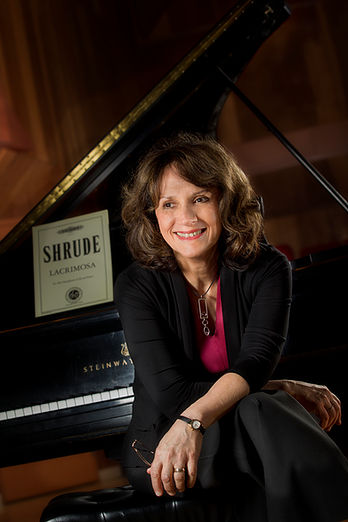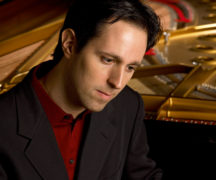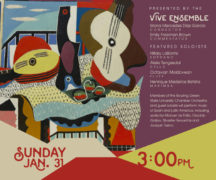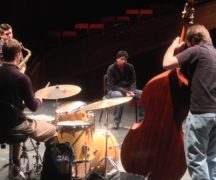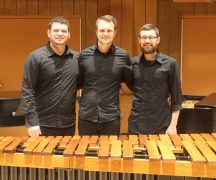By DAVID DUPONT
BG Independent News
When Marilyn Shrude traveled to New York City a month ago to celebrate her 75th birthday, she encountered plenty of familiar faces.
There was Brad Detrick who studied composition with her in 1977 shortly after she started teaching at Bowling Green State University, and there was her current BGSU colleague David Bixler, who chairs the BGSU jazz studies program, who came downtown with his wife, Heather, from their home in Washington Heights.
The program for the “Marilyn Shrude: 75th Birthday Celebration” had a similar chronological range, from “Evolution V” for saxophone quartet and alto saxophone soloist, a role filled by her husband, John Sampen, to the world premiere of the revised version of “Within the Wall.” She added the percussion part she had originally intended for the performance by the Lost Dog New Music Ensemble.
Garth Sunderland, the artistic director of Lost Dog, “was the main energy behind this,” Shrude said. The idea for the celebration concert developed from an exchange of emails between Shrude and Sunderland at the beginning of the pandemic.
She reached out to her former student who lives in New York City to see how he was faring as COVID gripped the city. They had, Shrude said, maintained contact over the years.
It was his idea to stage an entire concert devoted to compositions for small ensembles by Shrude.
He “leveraged” the concert through the ensemble, taking care of all the details, including paying for the hall and musicians.
Shrude taught Sunderland back when he worked as a counselor at the Interlochen Music Camp in Michigan where Shrude was on faculty. A student at University of Southern California, Sunderland wanted to take a break, so she helped arrange for him to study for a year at BGSU where he took lessons from her, studied cello with Alan Smith, and played in the BG Philharmonia.
He is now vice president for creative projects for the Leonard Bernstein Office. He works with Bernstein’s scores, which included providing new orchestrations for the recent film of “West Side Story.”
Sunderland reached out to composer, saxophonist and producer Erin Rogers, who received master’s degrees in composition and saxophone from BGSU, studying with both Shrude and Sampen.
The saxophone quartet she co-founded New Thread Quartet was, along with Lost Dog and the Momenta Quartet, one of the ensembles that performed at the celebration.
Rehearsals took place throughout the week before the Dec. 2 concert, spread over three different halls. The experience reminded Shrude of “the vastness of our profession.”
These were all gigging musicians who play in Broadway pit orchestras, for the Rockettes as well as performing in chamber ensembles and orchestras. They compose, arrange, teach, produce, and archive music. “There are so many dimensions to it.”
This was the first time since her doctoral recital at Northwestern University in 1982 that an entire program has been dedicated to her work, she said.
In the DiMenna Center for Classical Music listening to so much of her work at one sitting, Shrude said she realized “there’s a definite style to it now.”
That comes from using certain devices and approaches over and over.
“I often use the term neo expressionistic,” she said. While she eschews tonal centers, “it has a very expressive quality.”
Shrude said she’s been heavily influenced by her studies as a pianist especially the music of the Impressionists, Debussy and Ravel, as well as Olivier Messiaen and her experience as a church organist.
“It all has a profound influence on the use of natural resonance,” Shrude said. “I always say my music is about resonance.”
In an article in the journal of the International Alliance of Women in Music marking Shrude’s 75th birthday, her BGSU colleague musicologist Mary Natvig noted her penchant for writing phrases with a series of whole and half steps that turn back on themselves.
Shrude attributes that to the influence of Gregorian chant.
“I spent so much of my life living in resonant churches … that echoey quality with things overlapping.” Her pieces contain “a lot of nostalgia.”
Shrude started taking piano lessons from the nuns in her Catholic elementary school. She wrote her first piece, a mass, when she was 11. At 15 she entered the convent as a postulant. She continued to study piano, violin, and cello, and play organ throughout her studies at Alverno College. She was “a closeted composer.”
From 11 she was playing organ for masses “ and singing along back and forth with the priest,” she recalls. “That’s why a lot of my music has chant overtones, and the somberness of it, too.”
She was being trained to fulfill the musical needs of a Catholic parish, but at 22 during the turbulent time of Vatican II, she joined the droves who left their vocations.
Still, Natvig writes, that experience has shaped her life. “She has a tireless faith in the power and importance of creating, performing, and teaching new music.”
That was on display at the celebration concert.
“All these pieces are precious to me in different ways,” Shrude said.
“A Window Always Open on the Sea” from 1990 is “especially an important piece for me because the ensemble I wrote it for played it so many times,” she said in reference to the Core Ensemble, which also recorded the piece.
“Window” draws on the poetry of her former neighbor, the late Michael Mott, who taught at BGSU for many years. One of Mott’s daughters attended the performance, Shrude said.
The words of his poem “Autumn, Odysseus” are used as the titles of the six movements.
It is an approach, she employs as well in “Sotto Voce,” which draws inspiration from Henry Wadsworth Longfellow’s sonnet “Nature.”
She sets nine early poems by Emily Dickinson in “Secrets,” performed at the celebration by soprano Ariadne Greif and the Momenta Quartet.
“Within the Wall” reflects her travels to Italy. “It’s all about Michelangelo and making frescoes,” she said.
Adding to the success of the occasion was the quality of the hall. “I liked the intimacy of the room, the silence you felt when something was really quiet. A lot of my stuff is really quiet. You could hear the concentration going on in the room,” Shrude said.
“It was nice to enjoy live music again at such a high quality.”

